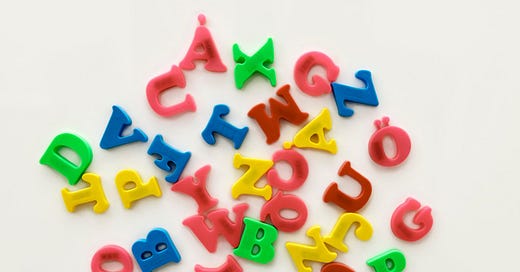Letting words guide us
Hi friends,
First up, here’s where to find me next:
Joint reading / conversation with Vanessa Cuti, author of The Tip Line
Monday, April 24, 7:00 p.m.
The Next Chapter, Huntington, NY
Joint reading / conversation with Richard Mirabella, author of Brother & Sister Enter the Forest
Spring Writes Literary Festival
Saturday, May 13, 5:15–6:45 p.m.
The Downstairs, Ithaca, NY
This week I’ve been writing an essay that began on Sunday as a newsletter issue and then took on a life of its own. I’m still figuring out what to do with it, so it’s possible it will one day fulfill its original purpose!
As I wrote it, I kept struggling with the structure, and I realized that the problem was I hadn’t figured out what I was trying to say. Just as I was ready to throw my laptop at the wall, however, I also realized that this was not some fatal flaw; it’s just my usual process. I always write to figure out what I’m trying to say. For some reason, it’s a lot more comfortable when I’m writing fiction.
I think it’s because real life is too messy. Our thoughts and feelings are often a jumble of conflicting voices yelling at one another across a crowded dinner table. Or mumbling incoherently into their coffee cups. As we experience life, we don’t have someone following us around with handy cue cards to help us make clear sense of it. It takes time to process.
Similarly, I’ve never been good at taking photos at social events. I want to capture lasting memories as much as the person next to me with their phone poised and ready to go, but when I do that, I feel like I’m missing the actual experience. I need to be planted firmly in the middle of it, paying attention, in order to enjoy myself. This is probably why I write.
Which brings me back to the essay I’ve been working on. Eventually, after I allowed myself to trust it would happen, the essay showed me what I was trying to say and I was able to finish a draft. And it made me think about the medium of writing. Which is, of course, words. Whether we’re so-called pantsers who throw outlines to the wind and write to see where the story goes, or planners, who outline every plot point before beginning, we rely on words to get us from the beginning to the end. Not only their meaning, but their nuance, rhythm, sound, and music.
When I was taking my second writing workshop, I was still fairly new to it and I had a cliched sense of what literary writing should sound like — kind of elegant and wordy. My professor was gently trying to guide me away from it, but it had been ingrained in me that this was Good Writing.
Then one day I was taking a walk and a phrase sort of floated down from the sky and latched itself to me: “Wind pushes.” I didn’t know what it meant, but it sat on my shoulder and kept whispering. “Wind pushes.” I let it stay. When I got home, I wrote it down, followed by another sentence and another, all of them flowing from those two words.
I ended up with a flash-fiction piece that sounded different from anything else I’d written. It wasn’t the elegant, wordy voice I’d come to associate with good writing, but a more experimental and urgent voice that seemed to have been buried somewhere in my consciousness.
I was nervous to share it, but my professor said it was the best thing I’d written for his class. With his and the other students’ helpful feedback, I revised it and submitted it to literary journals. It ended up being the first piece I published in a national outlet.1
So what is it I’m trying to say now? I think it’s this: Whether you’re writing an essay or a story or something else, writers play with words. We put them in an order and then move them around. We come up with better ones that sound more pleasing or precise. We throw a bunch of them out and start over. So maybe sometimes we should trust words more. Maybe sometimes words hold the key to a character or story. Maybe they are the character or story.
When my professor asked me what inspired me to write “Breakfast” and I told him about the words that had gotten stuck in my ear, he was surprised. Literary fiction usually starts with character. In this case, the words — something about their sound and rhythm and urgency — told me everything I needed to know.
Have fun with your words this week, and I’d love to hear how it goes.
Yours,
Jen





